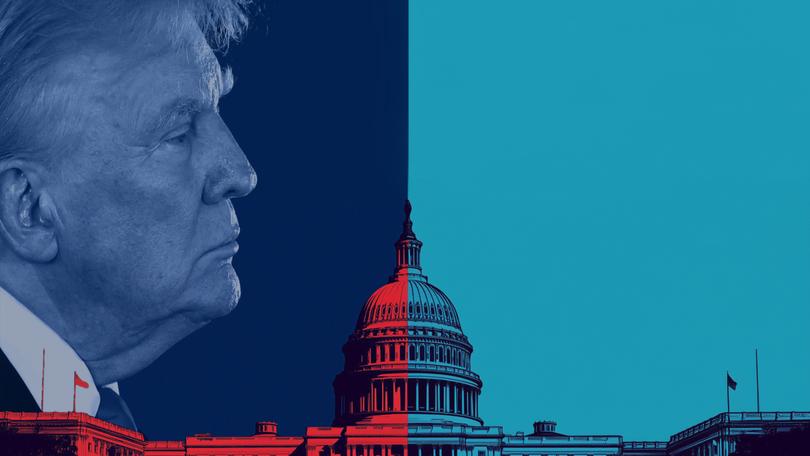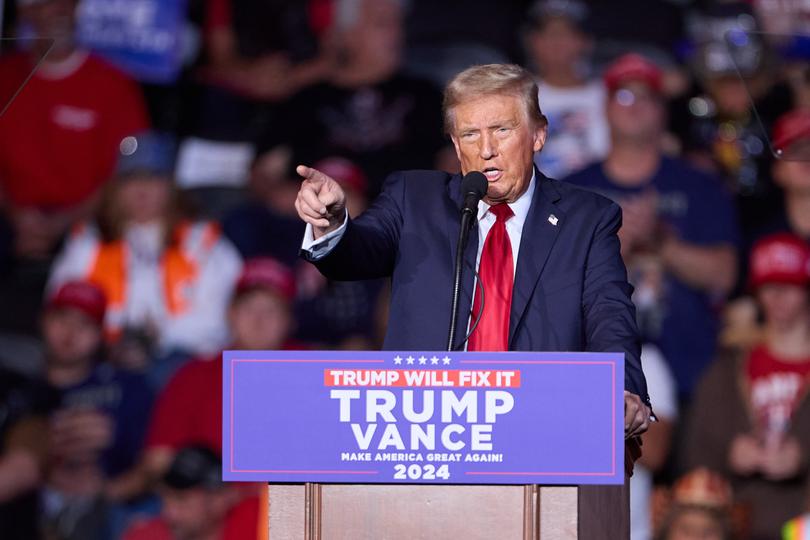AARON PATRICK: Win or lose, Donald Trump has changed the world
AARON PATRICK: For a seemingly divisive character, the former President enjoys enduring popularity. Is this a sign that US politics — and the world at large — has changed forever?

As Americans ready themselves for the conclusion of what may be the most consequential, and strange, election in history, Donald Trump ends the campaign almost unbelievably popular.
With the election too close to call, a Wall Street Journal poll put Trump’s approval rating at 48 per cent, three percentage points ahead of Democratic nominee and great progressive hope Kamala Harris.
Sign up to The Nightly's newsletters.
Get the first look at the digital newspaper, curated daily stories and breaking headlines delivered to your inbox.
By continuing you agree to our Terms and Privacy Policy.For a leader who welcomed the prospect of journalists covering one of his rallies being shot at, Trump’s enduring popularity is a sign of a fundamental shift in politics.
The power of elite opinion has been shattered.
In 1988 the uninspiring vice president George H.W. Bush won the Republican nomination because the party’s establishment backed him. He went on to win the election.
On Tuesday, much of the Republican establishment will vote for Harris, including a member of Bush’s cabinet, Dick Cheney.
The decline of traditional media has contributed. When an uproar erupted after Washington Post owner Jeff Bezos decided his paper would endorse neither candidate, few stopped to ask: how would any American’s vote be determined by an elite liberal newspaper?
If anything, Harris’s celebrity endorsements — the cast of the Avengers, for example — are likely to harden conservative opinion against her.
Political allegiance used to be measured on a continuum from left to right.

Today, some political scientists see politics operating on an X/Y scale, with cultural beliefs represented on the vertical axis and economic beliefs on the horizontal.
The weight of Trump support is on the vertical.
While his economic policies are a populist mish-mash of protectionism and deregulation, the culture wars drive his popularity.
The Trump political phenomenon is part of the backlash to the progressive social agenda that has captured academia, the public service and big business.
The new culture has spread across the world.
In Australia, any adult can now change the sex on their birth certificate, irrespective of their genitalia.
The greater importance of culture in politics has some strange consequences.
In Michigan, which has the only Muslim-majority US city, some residents are voting for Trump because Harris’s husband, Douglas Emhoff, is Jewish and her administration supplies arms to Israel.
Trump banned immigration from seven Muslim-majority countries in 2017.
The most potent effect is to draw the Democrats’ working-class base towards the Republican Party.
Millions of these voters believe their country is in a recession.
They’re wrong on the national level.
On a personal level, though, there is a profound sense across society the country has lost its way.
Polls consistently find two-thirds think America is heading in the wrong direction.
They haven’t forgotten that inflation hit 9 per cent under President Biden, feel healthcare costs are out of control and are afraid of illegal immigration.
In speeches, Trump likes to talk of “13,000 convicted murderers” who illegally entered the US when Harris was responsible for border control.
The claim is misleading but has an element of truth.
Immigration and Customs Enforcement has a list of 13,000 non-citizens convicted of homicide that it does not have detained, although some are in federal or state custody.
Americans are more likely to swap parties when worried about the future.
In this case, though, they can’t decide whether the vice president or the former president represents the greater change. Which is why the election is so close.
This week, one of Trump’s internal protagonists, former UN Ambassador Nikki Haley, offered an endorsement.
While acknowledging the unpredictable nature of the man, she called for Trump to be judged on his policies over his character.
“Will Mr Trump do some things I don’t like in a second term?” she wrote in an opinion article.
“I’m sure he will. For those of us clear-eyed enough to see Mr Trump’s flaws and honest enough to acknowledge them, the question is whether we’re better off with his policies or his opponent’s.”
Even if those who hate Trump can’t credibly assert they don’t know what he stands for.
On Monday evening, he gave a rambling end-of-campaign speech in Pennsylvania, one of the seven states pollsters say will determine the result.
After citing the stats about immigrant killers and promising to “get transgender insanity out of our schools,” he said the day he is sworn in would be “liberation day”.
The largest deportation of criminals in American history would begin, he said.
The crowd started chanting: “USA, USA, USA”.

